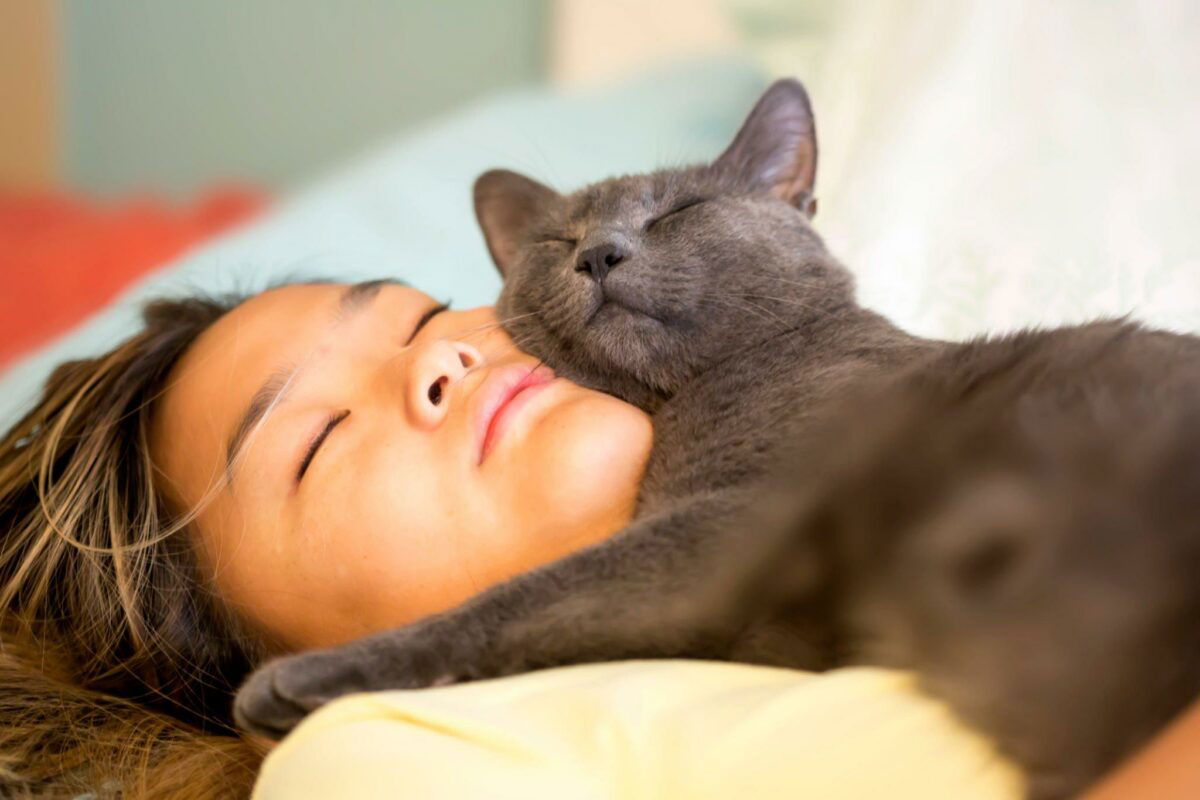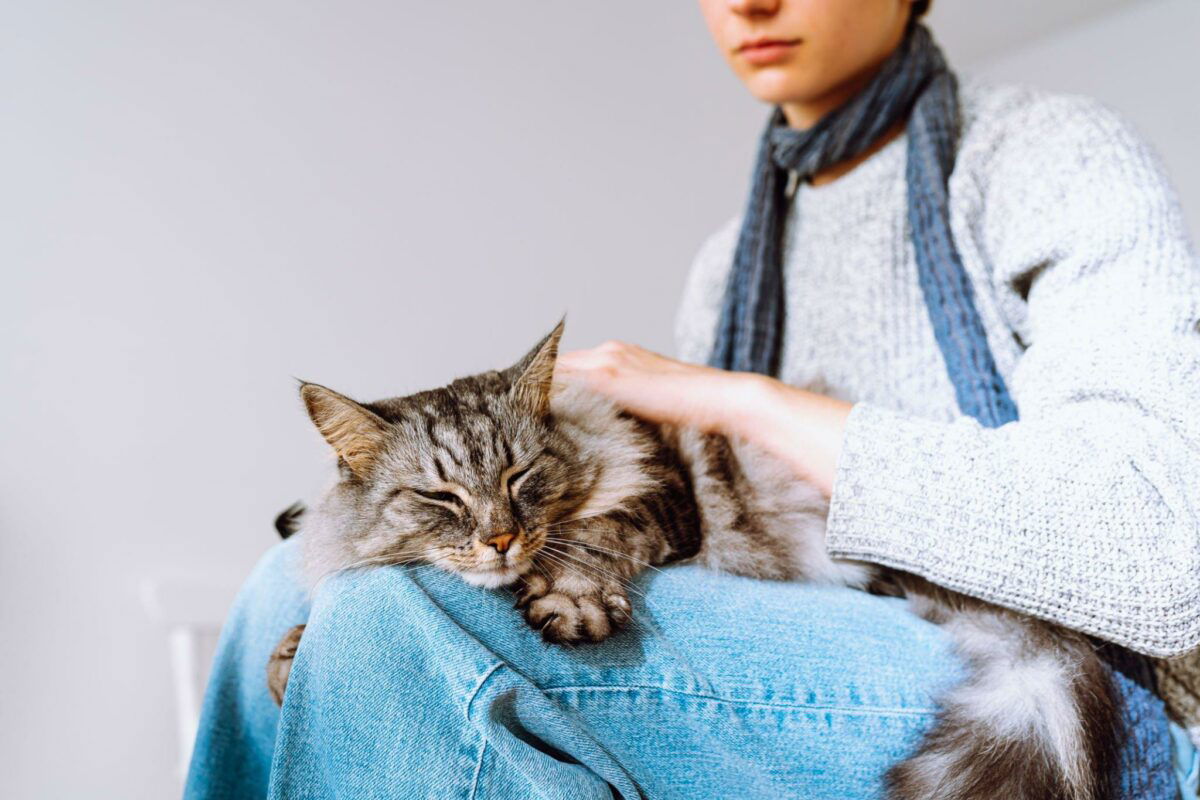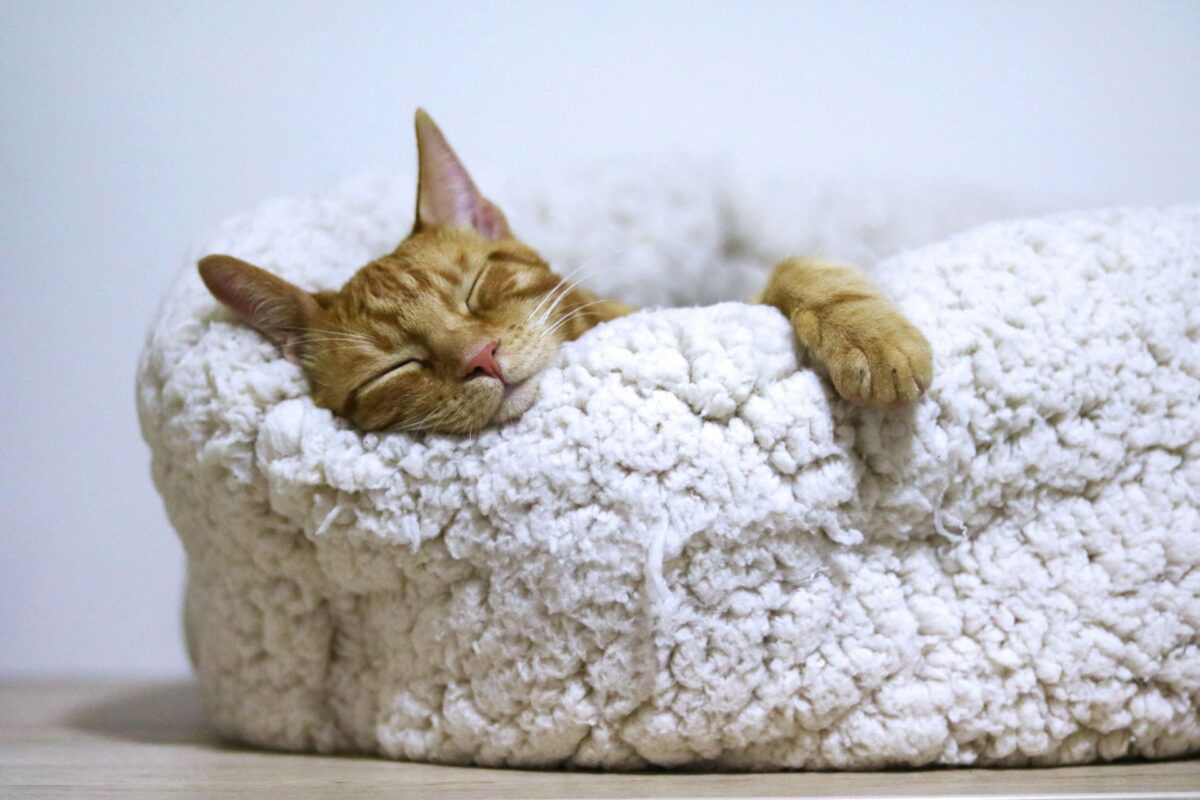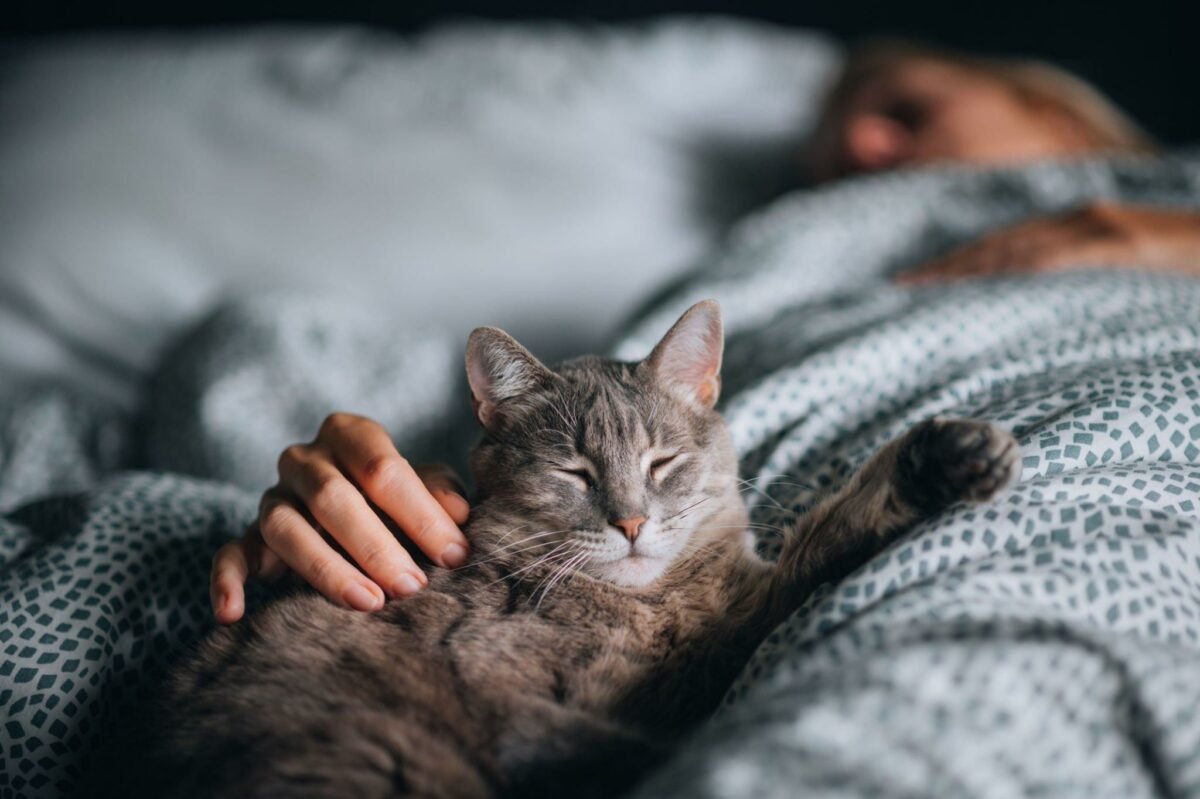We're an affiliate
We hope you love the products we recommend! Just so you know, we may collect a share of sales or other compensation from the links on this page at no additional cost to you. Thank you if you use our links, we really appreciate it!
Cats have lots of hours to sleep during a 24-hour period, and they can doze off on various places such as the couch, bed, table, and sometimes on you.
Most cats desire to cuddle and sprawl in a convenient, warm, and safe place as they transition from drowsiness into a light sleep stage.
So, why does your cat sleep on you?
Continue reading this article to discover the possible reasons why your cat may sleep on you and if you should let them continue with this sleeping behavior.
Feline Sleeping Behavior in A Nutshell
Before we jump into the reasons your cat sleeps on you, it’s important we understand some bits about cat sleeping behavior and habits.
Cats are well-known for their extended sleep duration. It’s estimated that an average adult cat can sleep for a period between 12 to 16 hours per day.
Yes, you read it right! That’s almost double the amount of sleep humans need in a single day. This further means that cats can spend almost two-thirds of their lives in slumber.

Another contradiction between cats and other household pets is that cats are crepuscular animals, meaning that they are active during the twilight period of dawn to dusk.
This means that you’re most likely to see your feline friend jumping on your lap for a quick nap during the day when working on your computer.
Why Does Your Cat Sleep on You?
The following reasons are why your cat sleeps on you:
1. Your cat is seeking warmth
Cats are naturally inclined to seek warmth, especially when relaxing or sleeping. You may have noticed that your cat may sleep in areas like heat vents or sunny spots due to the desired heat.
Warmth makes cats relax and it can also initiate restorative sleep from light slumber, which helps them stay healthy.
When your feline friend chooses to nestle on you, they’re getting the most out of your body heat, which is one of the coziest sources of warmth available for them during the night.
2. Your cat is marking territory
Cats are naturally territorial animals. Your feline friend not only sees you as their human caregiver but also as part of their expansive domain.
Sometimes when your cat snuggles on you, they’re trying to claim you by leaving their unique scent and pheromones all over your body.
This is an instinctual habit that was done in the wild by the cat’s ancestors where they would mark other cats to claim them as part of their group.
Territoriality is an important thing for cats especially those scared of losing your attention to other cats within your home.
Cats with the heightened urge to claim ownership can also rub their head against you or kneed on your body as part of leaving their scent trail.
3. Your cat wants to feel safe
Cats were both hunters and prey in the wild setting. To stay safe from potential predators, they would look for safe places to rest or recharge in between hunting sessions.
In our modern setting, sometimes your house cat may sleep on you because you are their main source of safety and security.

Cats can be vulnerable to potential danger during sleep, so this behavior shows that your feline friend trusts that you can offer protection during their defenseless hours.
This could also be one of those leftover behaviors from kittenhood. Your cat would always snuggle on their mom during their tender years because it made them feel protected.
During the adulthood stage, you are the one to take up that role of offering safety and security when your cat huddles on you.
4. Your cat is showing love and affection
Cats can express their love and affection in many different ways including sleeping or rubbing against their human caregivers.
Your feline friend is cuddling to stay close by you and to listen to your thrilling heartbeat rhythm as you sleep.
This is all about the strong bond, boundless love, and relationship that you’ve built with your furry friend over the years.
Next time your cat snuggles their way into your blanket, just know it may be a subtle way of saying ‘You’re special to me and I need to be closer to you.’
Keep in mind that this is not the only expression of love cats show their owners. You may have other cats in your home who barely sleep on you, but it doesn’t mean they hate you.
Every cat is an individual and they all have unique ways of expressing their unfiltered affection to people they love and cherish.
Some cats may express their affection by wagging their tail while headbutting your feet, being nearby, meowing, purring, or rolling over on their back.
Why Do Cats Sleep on Specific Parts of The Body?
Narrowing down on why your cat sleeps on you, it could be interesting to know why they do so on specific parts of your body. Let’s find out:
1. Chest
Most veterinarians believe that cats may have formed the habit of laying on their owner’s chest because the regular breathing cycle makes it comfortable for them to snooze with ease.
The sensational heartbeats mimic the comforting sounds your cat heard during kittenhood when they nestled close to their mommy and siblings.
Since your cat now considers you part of their family, sleeping on your chest may provide the comforting effect to stay at ease and sleep.
2. Head
In addition to being a good source of warmth, your feline friend may sleep on your head because it’s one of the body parts that has less twitching during sleep.
Your cat doesn’t want to get tossed back and forth when snoozing on you, so they would avoid areas such as the feet and arms.
It’s also possible that your cat sleeps on your head because they desire to maintain proximity to your eyes.
Some cats are drawn to snuggle around their owners’ heads because they love the smell of the hair.
Cats have a highly developed sense of smell and they can easily detect the depth of the scent on your hair.
In some rare circumstances, some cats may sleep on or near their owners’ heads as a way of asserting dominance or being confrontational.
3. Lap
Your cat may jump on your lap and stay still because they’re seeking your attention or they want to be petted before sleep.
Most cats are aware that the lap is a perfect spot that can easily be reached by their caregivers in addition to the warmth for a good nap time.

Your legs are less likely to move suddenly while seated on the couch, and this provides a secure and undisturbed environment for your furbaby to get some sleep.
RELATED: Why Does My Cat Sleep Pressed Up Against Me?
Should You Let Your Cat Sleep on You?
Yes, there’s nothing wrong with letting your cat sleep on you, and this will be a personal choice you have to make based on the pros and cons.
The advantages of letting your cat sleep on you
1. Stress relief
Allowing your cat to sleep on you can help in reducing emotional distress or anxiety, by providing a sense of security and comfort to calm down.
This advantage can also extend to you, since petting your cat during sleep can also lower the stress levels in humans.
2. Strengthening your bond
Being close to your furry friend through naptime can help strengthen the emotional connection and make your bond even better.
This is especially helpful if you spend most of your daytime at work, so returning at night brings the perfect opportunity to catch some cuddles with your feline friend.
3. Provides warmth and comfort
Sharing a cozy bed with your cat provides a warm spot for them to sleep with comfort. But the reverse is also true since your cat may also elevate your comfort, thanks to their furry body.
Disadvantages of letting your cat sleep on you
1. Sleep disruption
As we noted earlier, cats are more active during the twilight and this may disrupt your light sleep and make it difficult to progress into restorative sleep.
The good thing is that you can train your cat to adjust to your sleep schedule, and this can significantly reduce the disruptions.
2. Allergies
Letting your cat sleep next to you may exacerbate your allergic symptoms, especially if your body is highly sensitive to pet dander and fur.
3. Discomfort
Cats who love sleeping on your chest or head can cause discomfort to you especially if they’re weighty.
This is also risky because you may inhale pet fur and pet dander when inhaling, putting you at the risk of suffering respiratory problems.
A word of caution: Children under the age of five should not be allowed to share a bed with cats because of the heightened risk of suffocation and allergies.
On top of that, toddlers who don’t know how to interact with cats can disturb them during sleep and this may increase the risk of injuries.
How To Encourage Your Cat to Sleep in Another Place
If you feel like your cat’s sleeping behavior is disrupting yours, then you can encourage them to sleep in other comfy places out of will. So, here’s how to encourage your cat to sleep in another place:
Provide a Comfortable Alternative like a Cat Tree or Cat Bed
Your first solution will be to provide a comfortable alternative. Setting up a fully furnished cat tree and a comfy cat bed provides perfect spots for your furbaby to doze off.
If you have multiple cats, you can look at getting a cat tree for multiple cats.
For the start, you can place some of your clothing, like a worn T-shirt, in the designated sleeping area. This will fill the area with your scent, making the new spot more familiar to your cat.
Make sure your cat’s sleeping area is warm enough by adding a few cushions or blankets. This also adds comfort during naptime.
In other words, the sleeping surfaces should be made as appealing as possible by ensuring they are free from noises and intrusions.

Reinforce the Behavior Through Rewarding
If your cat chooses to sleep in their specific area without jumping on your bed, you can reinforce the behavior by rewarding them with a tasty treat and some cuddling.
Offering a few interactive cat toys can also be a good form of reward, especially if you have an energetic and active feline.
This will make your cat to associate their sleeping areas with good things and they will certainly build a positive association with the area.
Frequently Asked Questions (FAQs)
1. Why does my cat sleep on me and not my partner?
It is highly likely that your cat feels more comfortable and secure with you compared to your partner.
You may have formed strong emotional connections with them from a young age, which manifests in such strong bonds.
This is a sign that your feline friend wants warmth, reassurance, or petting during sleep, and they trust you can deliver more than your partner.
2. Why does my cat sleep on me and purr?
Purring is often regarded as the highest sign of feline love, contentment, and submission. Your cat is basically telling you that they’re comfortable and satisfied with your company.
3. Is it normal for my cat to sleep on me every night?
Cats who seek additional warmth and comfort may sleep with their human caregivers every night, especially during the chilly winter.
It could also mean that your cat has developed the habit of with time, and they’re much contended with sharing a bed with you every night.
4. Can my cat’s sleeping habit indicate an illness?
Sudden changes in your cat’s regular sleeping behavior can indicate an underlying problem such as emotional distress or physical illness.
Disruption during sleep, excessive meowing, and restlessness can all point to something disturbing your cat from within.
We recommend monitoring your cat’s habits to note the changes and report any abrupt behavior to your vet for professional guidance.
Conclusion
Cats will always seek a warm, secure, and comfortable place to sleep, and guess what? you may be the perfect candidate to provide the things they need for a perfect sleep.
There are both advantages and disadvantages to sharing a bed with your feline friend. Deciding on whether to let your cat sleep on you or not will narrow down to your preferences.
If you’re concerned about your cat’s habit of sleeping on you, we suggest you offer them a rewarding alternative sleeping spot furnished with warm blankets and a few interactive toys.
Remember that your cat’s sleeping behavior can indicate their health condition. Be sure to monitor them during naptime and check for abrupt changes and other warning signs of illness.
Laura is the founder of Furs'n'Paws. She is a also a pet writer and expert with more than 20 years of experience of working with dogs and cats. She developed a very strong love for animals at a young age. Her passion led her to establish a thriving pet sitting and dog walking business in Dubai. As an expert in pet training, behavior, and nutrition, Laura is committed to helping pet owners and pet lovers by offering high-quality information on a wide range of topics.



No responses yet